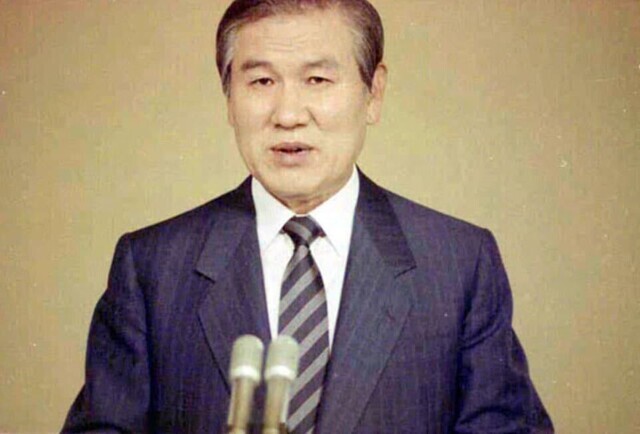hankyoreh
Links to other country sites 다른 나라 사이트 링크
Former President Roh Tae-woo, mastermind of 1979 military coup, dies at 88

Roh Tae-woo, former president of South Korea and a mastermind of the 1979 coup alongside Chun Doo-hwan (now 90 years old), died on Tuesday. He was 88.
Roh had been battling a bronchial condition and cerebellar atrophy for more than a decade. After his condition rapidly worsened on Tuesday afternoon, he was rushed to the emergency room at Seoul National University Hospital, in Seoul’s Yeongeon neighborhood. He died at 1:46 pm, about half an hour after reaching the hospital.
In a twist of fate, Roh passed away on the 42nd anniversary of the assassination of former president and dictator Park Chung-hee in 1979, which created the opening for Chun and Roh’s faction to seize power.
Roh was born in Dalseong County (today, the city of Daegu), North Gyeongsang Province, on December 4, 1932, and studied at Kyeongbuk High School. He was commissioned as a second lieutenant in 1955, following graduation from the Korea Military Academy.
Roh and Chun, another alumnus of the academy’s 11th class, set up a secret society inside the army called Hanahoe, which they used to build a power base. The two seized power in a coup d’etat on Dec. 12, 1979, after President Park Chung-hee was fatally shot by Kim Jae-gyu, his own spymaster, on Oct. 26 of that year.
Chun became president with Roh as his right-hand man, serving at various times as head of the security command, sports minister, interior minister, a lawmaker in the National Assembly, and head of the ruling Democratic Justice Party.
It was Roh, as the party’s presidential nominee, who acceded to ongoing protests demanding a revised constitution and direct presidential elections in June 1987. Roh accepted those demands in a statement on June 29. But it was still Roh who was elected president that December after Kim Dae-jung and Kim Young-sam split the opposition vote.
Historical assessments of Roh’s legacy have been unsparing, given his instrumental role in the 1979 coup, his involvement in the bloody suppression of protests in Gwangju in May 1980, and his accession to the presidency as Chun’s hand-picked successor.
Nevertheless, Roh has received some credit for his administration’s achievements. Under Roh, the government made diplomatic overtures to socialist governments in what he called “Nordpolitik,” arranged South and North Korea’s simultaneous admission to the UN, and held hearings on the corruption and oppression perpetrated by Chun’s government, known as the Fifth Republic.
Following his presidency, Roh was taken into custody in November 1995 in connection with a slush fund scandal and was put on trial, along with Chun. In April 1997, the Supreme Court of Korea finalized Roh’s sentence of 17 years in prison and a fine of 268.8 billion won (US$230.39 million). That December, he was released from prison through a pardon issued by outgoing president Kim Young-sam. Unlike Chun, Roh paid his fine in full in 2013.
Roh’s son, Jae-heon, visited Gwangju five times on behalf of his bedridden father between 2019 and this year to apologize for the Gwangju massacre. While in the city, Jae-heon also paid his respects at the May 18th National Cemetery, which honors the victims of the massacre.
Along with his son Jae-heon, who is director of the East Asia Culture Center, Roh is survived by his wife, Kim Ok-suk, and their daughter, Roh Soh-yeong. His wake will be held at the mortuary at Seoul National University Hospital on Oct. 27.
By Lee Seung-jun, staff reporter
Please direct questions or comments to [english@hani.co.kr]

Editorial・opinion
![[Column] Season 2 of special prosecutor probe may be coming to Korea soon [Column] Season 2 of special prosecutor probe may be coming to Korea soon](https://flexible.img.hani.co.kr/flexible/normal/500/300/imgdb/original/2024/0426/3317141030699447.jpg) [Column] Season 2 of special prosecutor probe may be coming to Korea soon
[Column] Season 2 of special prosecutor probe may be coming to Korea soon![[Column] Park Geun-hye déjà vu in Yoon Suk-yeol [Column] Park Geun-hye déjà vu in Yoon Suk-yeol](https://flexible.img.hani.co.kr/flexible/normal/500/300/imgdb/original/2024/0424/651713945113788.jpg) [Column] Park Geun-hye déjà vu in Yoon Suk-yeol
[Column] Park Geun-hye déjà vu in Yoon Suk-yeol- [Editorial] New weight of N. Korea’s nuclear threats makes dialogue all the more urgent
- [Guest essay] The real reason Korea’s new right wants to dub Rhee a founding father
- [Column] ‘Choson’: Is it time we start referring to N. Korea in its own terms?
- [Editorial] Japan’s rewriting of history with Korea has gone too far
- [Column] The president’s questionable capacity for dialogue
- [Column] Are chaebol firms just pizza pies for families to divvy up as they please?
- [Column] Has Korea, too, crossed the Rubicon on China?
- [Correspondent’s column] In Japan’s alliance with US, echoes of its past alliances with UK
Most viewed articles
- 1After election rout, Yoon’s left with 3 choices for dealing with the opposition
- 2AI is catching up with humans at a ‘shocking’ rate
- 3Noting shared ‘values,’ Korea hints at passport-free travel with Japan
- 4Two factors that’ll decide if Korea’s economy keeps on its upward trend
- 5Why Kim Jong-un is scrapping the term ‘Day of the Sun’ and toning down fanfare for predecessors
- 6South Korea officially an aged society just 17 years after becoming aging society
- 7Korea’s 1.3% growth in Q1 signals ‘textbook’ return to growth, says government
- 8Is Japan about to snatch control of Line messenger from Korea’s Naver?
- 91 in 5 unwed Korean women want child-free life, study shows
- 10[Reportage] On US campuses, student risk arrest as they call for divestment from Israel